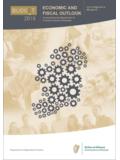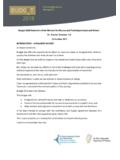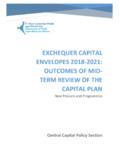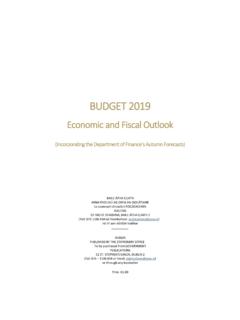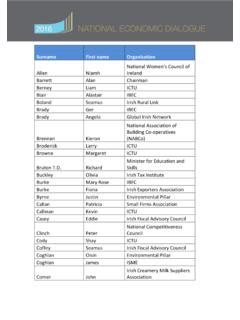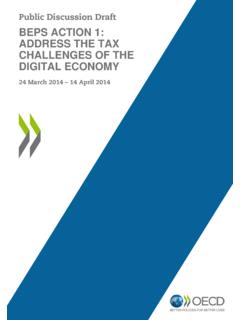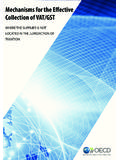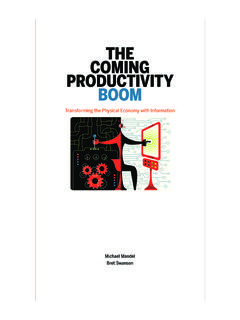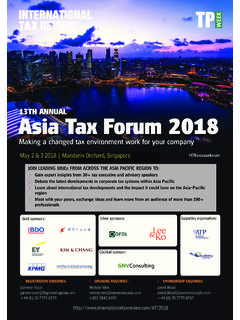Transcription of COMPETING IN A CHANGING WORLD - Budget
1 Department of Finance Government Buildings, Upper Merrion Street, Dublin 2, Ireland Website: COMPETING IN A CHANGING WORLD A Road Map for Ireland s Tax Competitiveness October 2014 Department of Finance | COMPETING in a CHANGING WORLD : A Road Map for Ireland s Tax Competitiveness Page | i Foreword by the Minister for Finance .. ii 1. Introduction .. 1 2. International Tax Policy Context .. 2 International context .. 2 Corporate context .. 2 Recent events and the proposed BEPS solution .. 3 Ireland s interaction with the international tax architecture .. 3 Ireland s commitment to OECD BEPS Project .. 4 3. Update on Ireland s International Tax Strategy .. 5 4. Road Map for Ireland s Tax Competitiveness .. 7 Road Map Summary .. 7 Road Map Detailed Commitments and Actions.
2 8 5. Conclusion .. 11 Contents > Department of Finance | COMPETING in a CHANGING WORLD : A Road Map for Ireland s Tax Competitiveness Page | ii Foreword by the Minister for Finance Across the WORLD the issue of how companies should be taxed has probably never before been as topical or as controversial. The globalisation of trade and the emergence of a new digitalised economy are but two of the reasons why political leaders, commentators and the public more generally are asking themselves whether current international tax rules are on the one hand effective and on the other hand fair. In a response to this, work is now ongoing in the European Union and at the Organisation for Economic Cooperation and Development (OECD) to redefine what is and what is not deemed to be fair tax competition, and to better align taxing rights with substantive activity.
3 Last year, at Budget time, I recognised the importance of these issues by publishing for the first time an International Tax Strategy for Ireland, a statement of the principles and objectives that guide our approach to international corporate tax issues. This document now provides an update on the objectives set out in that Strategy, and sets out a Road Map for Ireland s Tax Competitiveness now and into the future. I believe that there are both risks and opportunities for Ireland in terms of the international tax policy discussions which are now underway. It would be impossible to eliminate all the risks. But it is the Government s aim to manage the risks as best we can and maximise the opportunities for Ireland that will arise from the debate. For this reason, I am now publishing this Road Map to outline the set of measures being undertaken to reposition Ireland so as to be best able to reap the benefits, in terms of sustainable foreign direct investment, of a changed international tax landscape.
4 This Road Map builds on the results of the OECD BEPS consultation process run by my Department earlier this year, and was also informed by the comprehensive analysis underpinning the Economic Impact Assessment of Ireland s Corporation Tax Policy, which I am also publishing today. I hope you find this Road Map for Ireland s Tax Competitiveness both informative and useful. Michael Noonan TD Minister for Finance 14 October 2014 Department of Finance | COMPETING in a CHANGING WORLD : A Road Map for Ireland s Tax Competitiveness Page | 1 1. Introduction For more than 50 years Ireland has been successful in attracting mobile foreign direct investment (FDI) which has brought both employment and substantial investment to this country. Ireland's corporate tax strategy has three key elements: rate, regime and reputation.
5 The tax rate is settled policy. Ireland remains 100% committed to the corporation tax rate. This will not change. Countries are increasingly COMPETING for mobile foreign direct investment. As the Minister for Finance said in his 2013 Budget Day speech, he wants Ireland to play fair as we have always done and play to win. In that regard, the competitiveness of Ireland s overall corporate tax regime is evaluated on an on-going basis. Increasingly, tax reputation is also a key factor in winning mobile foreign direct investment. Over the last 24 months or so, the international rules for taxing multinational companies have been a focus for much discussion across the globe. The G20 has acknowledged that global challenges require global action. This is now happening through the OECD Base Erosion and Profit Shifting (BEPS) project, in which Ireland is playing an active part.
6 As part of the process of maintaining and enhancing Ireland s tax reputation, last year the Minister for Finance published a new international tax strategy statement which sets out Ireland s objectives and commitments in relation to international tax issues. With the strong signals from the OECD BEPS Project that international tax rules must change, Ireland now needs to place itself in the best position possible to become the country of choice for mobile foreign direct investment in a post-BEPS environment. This Road Map for Ireland s Tax Competitiveness aims to position Ireland towards maintaining the most competitive taxation offering that conforms with good practice. In conjunction with the non-tax measures set out in the Government s recent Policy Statement on Foreign Direct Investment in Ireland 1, this Road Map will provide the foundations for Ireland to continue to support the growth of our domestic companies and to maintain and expand our position as a thriving hub for FDI.
7 The next section (Section 3) sets out the international tax policy context within which Ireland now finds itself COMPETING for foreign direct investment. Section 4 contains an update on progress towards meeting the objectives set out in Ireland s International Tax Strategy published last year. Section 5 sets out the Road Map for Ireland s Tax Competiveness which contains a suite of measures to be implemented over the coming months aimed at repositioning Ireland towards having a best-in-class internationally competitive and sustainable tax regime. The Road Map relies heavily on research and analysis carried out throughout 2014, the results of which are contained a separate publication entitled Economic Impact Assessment of Ireland s Corporation Tax Policy . This work highlights how important a competitive corporation tax policy is for the overall Irish economy.
8 1 Policy Statement on Foreign Direct Investment in Ireland published by the Department of Jobs, Enterprise and Innovation, July 2014 Department of Finance | COMPETING in a CHANGING WORLD : A Road Map for Ireland s Tax Competitiveness Page | 2 2. International Tax Policy Context International context Internationally, corporate tax planning by multinational companies has moved to the top of the political agenda as a result of the global financial crisis. Tax planning by multinationals has evolved to take advantage of the differences between jurisdictions tax codes, which can unintentionally provide opportunities for some multinational corporations to significantly reduce taxation in a manner which is inconsistent with the policy objectives of such rules.
9 Rules put in place at a particular time for a particular purpose can give rise to unintended results over time. This is recognised as a complex global problem. Some of the international rules are also perceived as being outdated, as not having kept pace with evolution from traditional business structures to new models involving integrated global supply chains and the digital economy - where national borders become less relevant and the location of profit generation becomes more difficult to identify. Traditionally, a jurisdiction designed its tax laws to only take account of factors within its own borders. The tax laws of other jurisdictions, even its closest neighbours, were of little relevance. However as international markets became more integrated, especially with the arrival of the EU s internal market, borders have become more open and taxing rights less clear-cut.
10 The issue of which jurisdiction has the right to tax has become even more clouded by the emergence of the digital economy. The task facing tax policy makers and legislators from all around the WORLD is to put the appropriate rules in place to ensure as much consistency as possible between jurisdictions, which in turn will provide both taxpayers and tax authorities with a greater degree of certainty as to where and how income should be taxed. Against this backdrop, policy makers face an increasingly difficult balancing act designing tax rules which stimulate economic growth, whilst also managing to increase tax revenues. Tax policy is at the core of national sovereignty, and each country is free to devise its tax system in the way it considers most appropriate in accordance with internationally-accepted standards.

